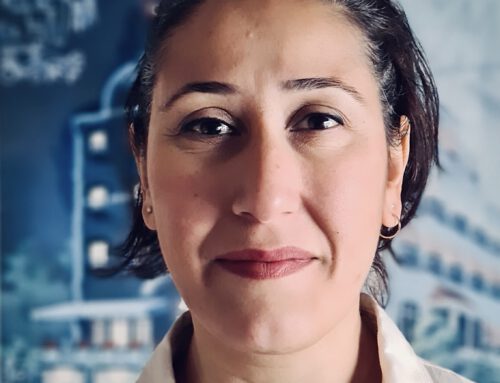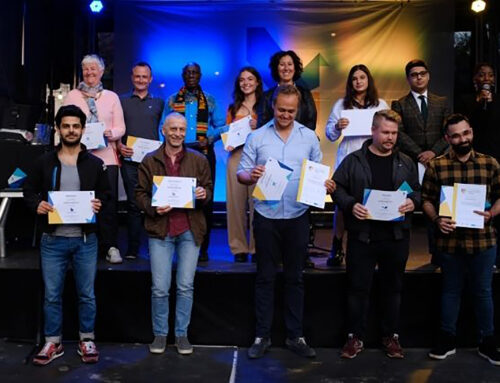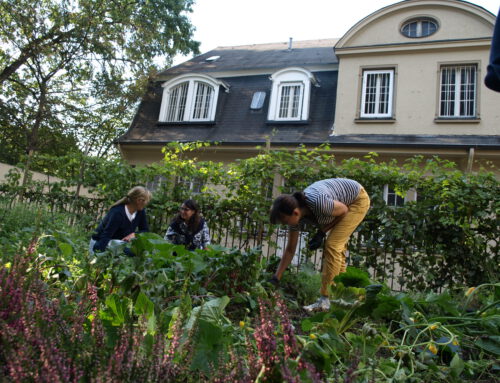This article published by Deutsche Welle on 13 July 2020. This page presents the English translation of the interview. Check the original page.(Spanish)
Unemployment, debts, and parallel societies depressed many Wuppertal residents. Then they found solutions against depression and for integration: sowing, planting, and harvesting together. Today there are many city projects.
The rusty staircase on the wall of the house in the nondescript courtyard is wobbly and leads almost vertically upwards: “Attention, the bottom step is loose, you must not step on it,” warns Burcu Eke-Schneider in an energetic voice. But this steep staircase is the only way to reach the roof garden in the cultural center of the Alevi community – right in the center of the former industrial metropolis of Wuppertal. Burcu Eke-Schneider climbs ahead full of verve: “Slowly, things are looking up.” The peace worker is not referring to this staircase, however, but to her project at the University of Wuppertal: the doctoral student wants to find out how integrative processes of an international community affect urban development.
“Most immigrants were farmers in Turkey, Spain, Italy before they came to Germany as guest workers after 1955,” Eke-Schneider explains. “Now the fourth generation of immigrants lives here and has no idea about rural life. That’s a big loss of knowledge, tradition and identity.” That’s where her idea of the Peace Garden comes in, the latest of many multicultural garden initiatives in the big city in Bergisches Land. The doctoral student, who came to Germany only four years ago without any relatives, initiated it.
At that time, the unemployment rate had already fallen from its former level of almost 20 percent, and a spirit of optimism was palpable. On the other hand: 40.5 percent migrants, people of 160 different nationalities, live in Wuppertal. Their risk of poverty has risen in recent years.
“Many live in parallel worlds here. But the green spaces are our melting pots. Everyone is equal here,” says the 38-year-old power woman. Nature reveals itself as a true place to forget differences in language, origin, culture, religion, tradition. Here, she says, everyone is welcome and accepted in order to engage in conversation. This is where people become aware of their responsibility for the future of cities and work together to develop solutions for peace, climate justice and the preservation of biodiversity,” says Eke-Schneider.
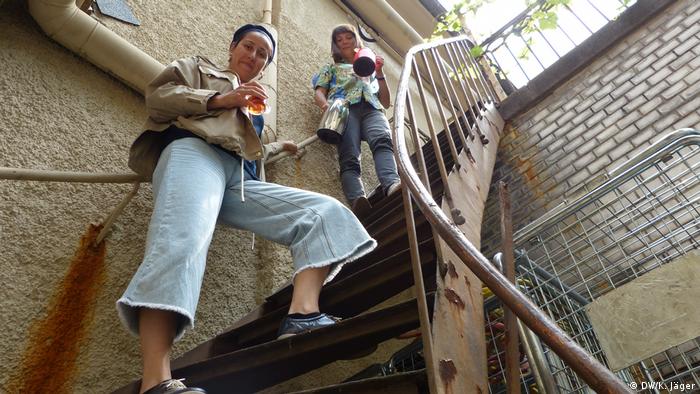
Only this path leads up to the Peace Garden: Burcu Eke-Schneider (front) and Johanna Dimmer are part of the community working for peace, climate justice and biodiversity.
Green melting pot in the city center
Up here in the Peace Garden presents a picture of wild nature with ivy vines, compost heaps, dead wood for insects and an area with orderly planting rows. Following spacing rules, seeds were sown in the spring for herbs, cabbage and lettuces. “The Corona Lockdown in particular has shown us that nature is the way to go, that we can feed ourselves healthy food and even share it,” Eke-Schneider has learned. The green oasis has become a refuge on the doorstep:
“Zucchini, lettuce, arugula, onions, eggplant, cucumbers, peas, beans, squash,” Johanna Dimmer lists, “tomatoes grow in a raised bed.” Dimmer is completely in her element. She grew up in Prague. But the family spent weekends at the “dacha” in the countryside.
As a child, she learned to grow vegetables and fruit, to appreciate what she had harvested, and to cook and preserve it. Today, she draws on the experiences: “I associate positive memories and feel very close to my family through the activities here in the garden.” Johanna passes on her knowledge and connection to nature to her young son and shares it with her Wuppertal friends. Ten came to the garden that day. Some have provided tea and cookies in the still makeshift seating circle.
Joint planting activities in such plots not only promote togetherness, they strengthen civil society and help secure urban food supplies, say studies such as those by the Fraunhofer Institute and the Federal Institute for Research on Building, Urban Affairs and Spatial Development.
Johannes has also learned to appreciate gardening together: “Being outside, for a long time I only experienced that in connection with soccer.” In the meantime, he enjoys the peaceful silence at the center: “Gardening has potential.” For 20-year-old student Ekinsu, the group offers family substitutes. Bengi Çiplak, who is the same age, grew up without a garden or balcony of her own; she has previously been involved with young people in the Alevi faith community.
Now she’s planning a plastic-free, sustainable seating area here in the green: “We all come from different backgrounds, so we bring a lot of ideas to the table.” The word migrant, black, white with reference to skin color or mentioning the country of origin – terms that could stigmatize are deliberately not used by these Wuppertalers. “Language should connect, not divide,” Burcu Eke-Schneider says, citing the reason.
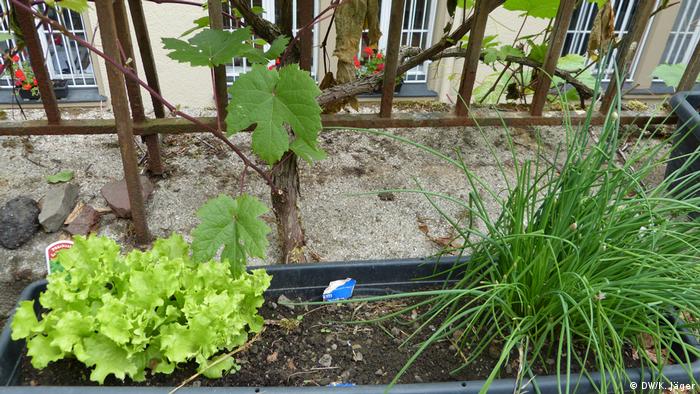
Lettuce and chives – small harvest in the balcony flower box from the roof garden of the Alevi Community Wuppertal
Desire of self-sufficiency as a result of the Corona pandemic.
For Burcu Eke-Schneider, this common garden above the cultural center is “the heart of the city,” where “peace and love” should flourish alongside magnificent plants. That is why the idea giver named it the Peace Garden.
Local politician Yazgülü Zeybek is visiting the rooftop garden for the first time. She thinks this and other garden initiatives are great: “Especially during the Corona Lockdown, the desire to grow their own fruits and vegetables arose in many cases. People who don’t have their own garden or balcony can now do that in community and exchange ideas.” For the city, he said, it’s important to create a “public, edible” city. “We support these projects for sustainability and diversity and want to create even more space for such areas,” promises the top candidate of Bündnis 90/ Die Grünen in the city council.
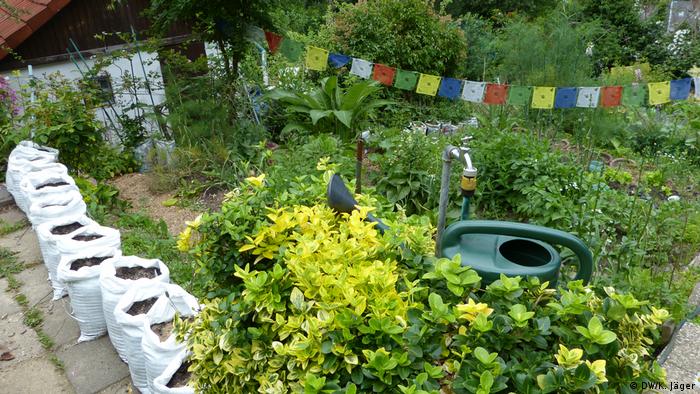
So that it greens and blooms: Soil and compost – sponsored by the waste management companies of the city of Wuppertal and produced from green waste
The municipal waste management companies provide compost and potting soil at low cost. In addition to the Peace Garden, Wuppertal has the Inselgarten, the Ark Garden, the Honey Garden, the Plant Bar, the Permaculture Farm and many more. A climate-neutral neighborhood farm is to be created on a former railroad site with a total area of around 60,000 square meters, a unique project in Europe. And in the Utopiastadtgarten, the creators are applying the aquaponics method. The Wuppertal movements are influenced by international urban gardening projects such as those in New York.
Home feelings and hearts that beat for nature
The allotment garden is a German invention. Small garden plots, also called allotment garden colonies, are in great demand, especially in big cities. They have sprung up on brownfield sites, for example near railroad yards. In Wuppertal alone, there are 7,000 allotment gardens, organized in 116 associations. Nationwide, 82 percent of all allotment garden associations include migrants.
“Multi-Kulti is an important concern for us,” says Fritz Ortmeier of theStadtverband der Gartenfreunde: “All genders have the same rights, but flagpoles are banned, and the German language for communication is important to us.”
Anja and Wadii Serhane were lucky and were able to lease a garden share, a stone’s throw from their apartment. In the allotment colony on the hill, with a magnificent view of the city, flowers bloom lushly, vegetables grow in great quantities, insects buzz around, wild herbs are allowed to sprout.
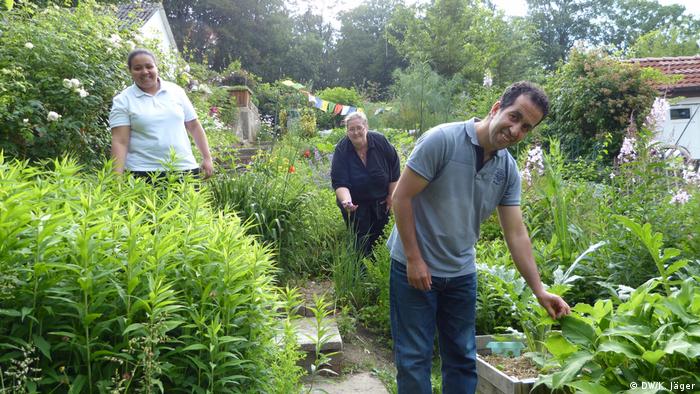
Gardening and experiencing nature is a real passion of Alae (left), Anja and Waddii Serhane – here in the Serhanes’ allotment garden in Wuppertal
“The passion comes from me,” Anja Serhane enthuses. “My husband grew up in Morocco in the city. His grandparents had a self-sufficient garden there in the countryside.” The couple beams: “Meanwhile, I love touching the earth, seeing how soil, compost, cow manure, horse droppings mix,” says Wadii Serhane. Pure happiness speaks from his eyes.
Anja Serhane initially envisioned a garden just for bees and bumblebees. She also infected her husband with this passion: The economist keeps three bee colonies – species-appropriate: the animals are allowed to keep the honey. “In the meantime, we grow everything that is expensive in the health food store, lettuce, herbs,” says Anja Serhane and adds, “We have experimented a lot, experienced snail and weed invasions. Since we’ve been gardening without digging up, using the no dig method, practicing permaculture and using only organic seeds, we’ve had success.”
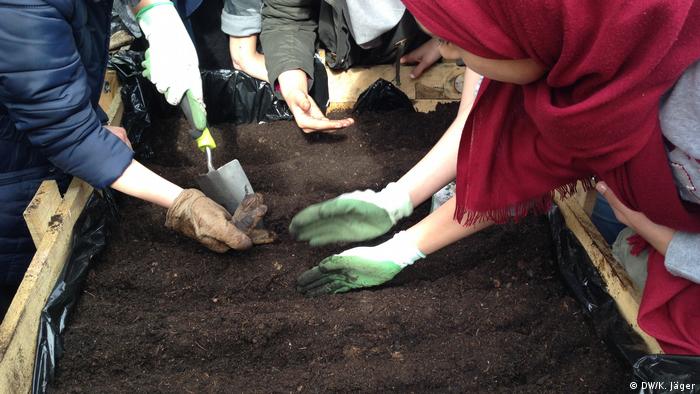
“Buddel dich fit”: Producing something together, experiencing it together – young people plant a raised bed in the “Intercultural Urban Garden” of the Islamic Community Wuppertal
“Buddel Dich fit” – in the mosque garden
Wadii Serhane also runs the leisure project “Buddel dich fit” for children and young people in the intercultural garden on the grounds of a mosque and on a playground – with expert support from his wife. For this, 16-year-old Alae has sown lettuce, herbs and pumpkins in raised beds. “In the winter, we watch movies about urban gardening and seeds. In the spring, we plant seeds, and in the fall, the kids share the harvest with adult community members. It’s always a great experience,” Wadii says. And particularly remembers the feedback from a youngster who said to him, “Uncle, I feel like I’m in Morocco when I’m gardening together. That comment triggered strong feelings in me and encouraged me to keep going.”
Anja and Wadii Serhane find fulfillment in passing on their experience and enthusiasm for organic gardening. And Alae has started sowing herbs on the balcony at home: “My father is quite enthusiastic: Now he is looking for an allotment.”

